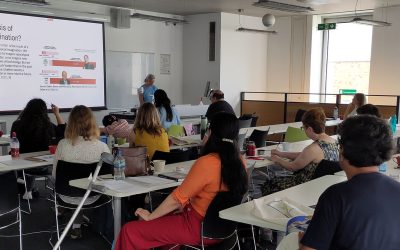Last summer, I had the pleasure of undertaking a research stay at CeMoRe, as part of my ongoing PhD research based at Roskilde University in Denmark. During my stay, I was fortunate to receive supervision from CeMoRe Co-director Joe Deville, with whom I share an interest in the everyday life of debt. He has proven to be an excellent supervisor. As a considerate and encouraging interlocutor and a perceptive and original thinker, Joe pushed my research forward into rewarding and exciting new terrains. I very much hope to continue our working relationship and to potentially visit CeMoRe again in the future.
In this post, I will present part of what I worked on during my research stay, namely a presentation I delivered in August 2019 at the 14th European Sociological Association conference, held at the University of Manchester. In this presentation, first, I briefly present my PhD project on the everyday narratives of people struggling with debt. Then, second, I bring forth an analysis of the politics of debt in Denmark lived through as a cleansing procedure.
Although references to mobilities research are not to explicit in the paper, this does not mean that such perspectives were absent from my thinking when I wrote it. Quite the contrary, this presentation could – and should – be read as how debtor mobilities are governed and how the experiences of these mobilities seek to be controlled. The paper touches on how debtors’ movements and progression can connect strongly with their sensations of justice and meaningfulness. Going forward, I want to stress the critical potentiality of being attentive to non-mobility and how experiences of “stuckness” can reveal both the epistemological and very real violence that unfold beneath dominant narratives. I hope you enjoy the read.
The politics of debt in Denmark as cleansing procedures
In the aftermath of the financial crisis, Nietzsche’s meditation on ‘Schulden’, meaning “debt”, and ‘Schuld’, meaning “guilt”, has regained its relevance. From David Graeber to scholars of financialisation, debt is theorised as overstepping the imagined opposition of economy and morality, conceived as the moral promise to repay money. Debt becomes a crucial artefact of our neoliberal epoch in its insistence on the conflated economic and moral responsibilities of individuals rather than markets or states. Recently scholars have criticised this portrayal of debt as being socially acontextual. They call for closer studies of experiences of debt in plural – instead of working from the perspective that debt is done to people as a monolithic power, they explore how debts are being-coproduced by people in everyday life. They call for studies that are situated elsewhere than in the neoliberal UK and USA, and for trying on innovative theoretical lenses able to zoom in on the intimacies of debt.
Inspired by this call, I have done fieldwork with debtors and organisations that govern problem debt in Denmark. More specifically, I have conducted observations and interviews at various organisational sites – at debt collection agencies, bailiff’s courts, debt advice agencies and bankruptcy courts – and recruited debt-ridden people for 25 in-depth interviews.
Going forward, I will analyse peoples’ narratives of problem debt by thinking with the underused theoretical framework of French Pragmatic Sociology. Inspired by the work of Jeanne Lazarus, I theorise debtors’ narrative as comprised of a series of tests. The ‘test’ concept refers to a critical situation where the beings – both human and non-human – making up the situation are gathered, evaluated and sought re-arranged accordingly. A test thus requires that beings are judged according to a normative, moral standard. For instance, are debtors’ receptivity to instalment agreements tested by collectors. The debtor gathers the beings of the income streams, expenses and sentiments towards the collector and evaluates the proposition according to the moral principles of wealth and loyalty.
By exploring the morally grounded experiences of debtors in Denmark, I synthesise the insights of both the original and more recent literature: namely, that debt is shrouded in morality and that moralities will change according to the social context of the debt in question.
Focusing on morally laden tests might seem problematic in a Danish context. It is often assumed that Denmark is a welfare state paradise. This suggests that the state dispenses with blaming problem debt on individual debtors by providing measures that help them out of over-indebtedness. In this presentation, I will question this assumption.
In the following, I will outline the debtor’s organisational journey as analytical point of emphases in my overall analysis. I argue that the organisational tests collectively amount to a narrative of transgression, atonement and purification. This has led me to Mary Douglas’ work on meaning systems or ‘cosmologies’ of dangerous dirt and purity that will theoretically inform my analysis. I will exemplify and animate the analysis by drawing on the narrative of a woman named Hannah who is struggling with debt.
Debt out of place? From formal organisational power to pollution beliefs
I met Hannah in the waiting room at a debt advice agency – an NGO that provides free financial counselling for people with low income and substantial debts. Hannah and I talked and she agreed to let me observe her advice session and to an interview. During the interview, she relived her darkest moments. She had gone through a divorce with an abusive partner, lost her job and economic control, selling their loan financed cars and house with a huge loss before an eventual foreclosure. She tells me that it felt like her debt detached itself from the objects and raised up like a heavy dark cloud that would “move into her”. She was convinced that people on the street could “see the debt on her”, so she made sure her children wore nice, clean clothes. She could not forgive herself for reneging on her financial obligations and felt all alone in the world. At one point, she was so out of her depth, that she locked herself in the car, contemplating suicide.
I argue that Hannah’s experiences can be theorised as experiences of being impure or dirty. Douglas defines dirt as “matter out of place”, meaning that it is something abnormal and detrimental to something else. Dirt is never absolute but relational, referring to a situation where a transgression of the naturalised pattern of things – such as obtaining credit, servicing debt and eventually redeeming it – has occurred. A transgression implies that boundaries have been overstepped and is now set apart from the rest – in Hannah’s case she experience such separation both in the form of feeling isolated and monitored by people outside. In this way, she comments on the relationality of uncleanliness. During the interview she also touches on the corporeality of feeling separated, saying how her debt felt like a “wound” or a “disease” and pictured her body “slouching” around. If we consider this encounter as a critical situation in which strangers test Hannah, it is apparent that what is challenged is not simply her financial stability, but the way she relates to the world. This is the ultimate experience of impurity.
Hannah also talks about the daily trembles of anxiety when opening up debt collectors’ letters. She would call them up and be met by a condemning tone, threatening her with becoming a “bad payer” if she refused to pay. In this way, she alludes to how organisational relations – and not only people outside – shape embodied experiences of debt by – I argue – producing and harnessing feelings of impurity.
Collectors distinguish between defaulting debtors with a so-called “willingness to pay” and those lacking such a “conscience”. The idea is that the former are receptive to moral prompting – agreeing to instalment plans now or possibly later. As Joe Deville has shown in a British context, moral nudging becomes the central tool of collectors, when more efficient solutions are off the table. I argue here, that the moral conscience of debtors is not only the key issue or test for collectors but is the guiding logic of the politics of debt in Denmark viewed as an organisational whole or system. I will begin to unpack this argument by moving one step further along the debtors’ journey, namely to the bailiff’s court.
Collectors send cases to court to extend the expiration date of the debt – meaning the amount of time that debt can legally be collected – and to get collateral in the form of an asset. In Denmark, private creditors cannot systematically extract defaulting debtor’s income unlike the state tax authority. This means that: 1) they have virtually no way of punishing a defaulting debtor if she states she has no payment ability nor any assets above a legally specified poverty line. And 2) collectors have no official databases to assess whether that is indeed a factual statement. Put schematically: my interpretation is that what is assessed in court is not really the payment ability of the debtor but the debtor’s performance of payment ability. Said differently, the organisations are forced to test the objective debt by leaning on the debtor subject. So, while the vast majority of debtors are deemed to have no payment ability by bailiffs and collectors, these actors meet the debtors with distrust – and understandably so. At the same time, debtors agree to payments out of ignorance about their rights and a sense of guilt even though they end up living well below the poverty line.
If we return to Douglas, we can see that creditors are trying to categorise debtors according to their moral conscience. They do this as part of their effort to arrange their own organisation and the defaulting debtors around the anticipation of repayment. As they do not have the resources to neatly filter the debtors, each categorised item is ambivalent or messy. This means, that Hannah and so many others are treated as someone possibly dangerous to their operation.
Social systems have a tendency to defend themselves when their valued patterns and categorisations are in danger of being undermined. Douglas suggests that when moral transgressions are not met by firm practical sanctions, then – to supplement this lack of punishment – pollution beliefs are called in. The belief entails that the transgressor has committed acts that unleash dangerous ripple effects – like the infectious “disease”, Hannah mentioned. These ripple effects reinforce moral outrage and the demand for practical punishment. We can now interpret the organisational dynamics contributing to Hannah’s experiences of impurity. To put it succinctly: because creditors have weak practical sanction power this opens the terrain for informal sanctions of debt recovery, which fuel and sustain the social moralisation and marginalisation of debt default.
Cleansing the cosmos of the debt economy – or narrative and very real violence?
In her period of crisis, Hannah decided to phone a suicide crisis line. The person asked what the most difficult thing is – “my debt”, she replied. The person suggested that she seek debt advice. Debt advice involves further tests that I do not have time to explore now. However, the consequence in this case was that Hannah’s advisors suggested she apply for debt adjustment.
When people do not own a payment ability and their debt becomes hopeless to service, they can apply for court ordered debt adjustment. After completing an adjustment procedure, the debt is settled. The debt adjustment arrangement thus definitively regulates the temporality of problem debt.
If the bankruptcy judge cannot initially rule out that the applicant is qualified for adjustment, a legal assistant is appointed. The assistant’s job is to go over the history of how the debt problems occurred and of the debtors’ financial behaviour. If the debtor has demonstrated careless financial behaviour such as not showing willingness to pay when ability has been there, then the debtor will fail the adjustment test and is urged to withdraw the application. If not, then the assistant will device an adjustment plan. Plans usually last five years, where debtors have to pay down everything over and above the amount required to live on the designated poverty line. Often this would amount to a small percentage of the total debt. In Hannah’s case she is to pay 3.000 a month for five years to settle a million plus in outstanding debt. But for Hannah – and most other applicants – that percentage would cut her living standard to the bone. Debt advisors often say that they have to “live on a rock”, translated as living hand to mouth. Accordingly, debt adjustment is an ambivalent solution: both a release valve for those deemed worthy of it and a punishment for needing such a release.
In Danish, debt adjustment can literally be translated as “debt sanitation” or “clean-up”. The question is what does it clean up?
I suggest that we can perceive the adjustment tests as a series of rituals that control the applicants’ experiences. Taken together these rituals of strict budgeting, saving and repaying perform formalised gestures of orderly economic behaviour. Order – a heavily used word – signifies both a test of economic management and a judgement of character – of being “orderly”. The rituals commence with a confessional rite where the financial history is laid bare. This makes sense, as compensation requires that responsibility has first been placed and matched by a sentence – just as order presupposes a responsible agent in charge of ordering.
I suggest that paying a fraction would not set the record straight between individual debtors and creditors – this would seem like an empty gesture. I hypothesise that the rituals should rather be thought of in relation to a much grander test. Again, it is important to stress the concept of order, as rituals construct a symbolic link between physical bodies and the overall social order or body politic. I argue that what is tested is the meaning system or cosmology underpinning and demarcating our debt-driven economic order. By making people go through a rite of passage of confession, ascetic atonement and redemption, the moral promise – or rather “willingness” – to repay money is fulfilled. The debt – believed to be polluting – has been washed away and order restored. This belief does not seem so strange in light of recent times, where contagious defaults actually resulted in systemic breakdown. The Danish state has thus put in place a procedure that is suppose to cure the body economic by cleansing the bodies of problem debtors.
The question is if this if the Danish welfare state succeeds with this narrative? In other words, if the sense of being a socially polluting force is controlled and offset by the cleansing procedures of state?
Debt advisors have told me that about a third or more of the advisees are basically lost cases. They are too poor to settle their debts out of the court system and they cannot meet the criteria of adjustment set within it. They are taught to live on or below the poverty line endlessly. Here rituals of orderliness do not lead to redemption but amount to being stuck in an organisational loop as a waste product. Without a cosmological journey to provide their sufferings meaning, many lose hope and become self-destructive and socially isolated. Fittingly, a woman in this situation told me that it was “as if I can never become clean”.
Benjamin Schwarz is a PhD Fellow in Social Studies at the Department of Social Sciences and Business at Roskilde University, Denmark.
Cover image by Nikos Koutoulas. Used under a CC BY-NC 2.0 license




